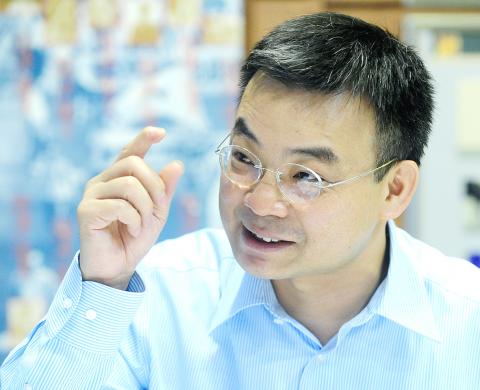Economist Honigmann Hong (洪財隆) was appointed director of the Democratic Progressive Party’s (DPP) Department of China Affairs as DPP Chairman Su Tseng-chang (蘇貞昌) filled the last three remaining spots of department heads.
Hong, an assistant economics professor at National Tsing Hua University, will take over the Department of China Affairs, which was reinstated on July 25 after being merged with the Department of International Affairs for five years, DPP spokesperson Lin Chun-hsien (林俊憲) told a press conference.
Su, who finally completed his political team roster after assuming the party’s leadership in May, picked Hong, 46, for his expertise in regional economics, a key issue in cross-strait relations, Lin said.

Photo: George Tsorng, Taipei Times
The reinstatement of the department and a plan to establish a China Affairs Committee as a policy-making platform have been seen as attempts to improve the DPP’s ties with Beijing.
The establishment of the much-discussed committee, which is expected to oversee the DPP’s China policy, is still in the works. Former premier Frank Hsieh (謝長廷) was reportedly interested in leading it.
Additionally, Chang Chi-chang (張基長), a Su confidant, was named director of the Department of Youth Development, while Ho Po-wen (何博文), a journalist-turned-political commentator, was tapped as director of the Democracy Institute, Lin said.
In related news, Su convened a meeting to discuss the party’s position and strategy on a proposed cross-strait investment protection agreement, which could be finalized in an eighth round of cross-strait negotiations on Thursday.
The meeting, which gathered party officials and more than a dozen legislators to seek a unified position on the issue, concluded with four demands to President Ma Ying-jeou’s (馬英九) administration.
First, the DPP insisted that the agreement must protect the personal safety and basic human rights of Taiwanese businesspeople in China, Lin said, adding that China should notify Taiwan within 24 hours of all cases of Taiwanese being detained and allow detained Taiwanese to hire lawyers.
Second, he said, regulations on Chinese investment in Taiwan should be written into law and government agencies should be established to monitor the investments.
Third, Lin said, cross-strait negotiation should be transparent and monitored by the Legislative Yuan because the opaque negotiation process in the past four years was the primary reason the academics and the legislature were concerned about the bilateral talks.
Last, the DPP urged the government to conduct thorough reviews on the implementation of the 16 agreements signed in the past before moving forward, Lin said.
The implementation of those agreements was questionable because Hon Hai Group chairman Terry Gou (郭台銘) was still complaining about infringement of intellectual property rights (IPR) in China two years after Taiwan and China signed the IPR agreement, Lin said.
Meanwhile, China remains a haven for Taiwanese criminals, despite the Joint Fight against Crime and Mutual Legal Assistance Agreement having gone into effect in June 2009, Lin said.
The DPP has no plans to organize any form of protest against the cross-strait talks, Lin said, but it would not bar its party members from taking part in protests.

Taiwan would welcome the return of Honduras as a diplomatic ally if its next president decides to make such a move, Minister of Foreign Affairs Lin Chia-lung (林佳龍) said yesterday. “Of course, we would welcome Honduras if they want to restore diplomatic ties with Taiwan after their elections,” Lin said at a meeting of the legislature’s Foreign Affairs and National Defense Committee, when asked to comment on statements made by two of the three Honduran presidential candidates during the presidential campaign in the Central American country. Taiwan is paying close attention to the region as a whole in the wake of a

President William Lai (賴清德) has appointed former vice president Chen Chien-jen (陳建仁) to attend the late Pope Francis’ funeral at the Vatican City on Saturday on his behalf, the Ministry of Foreign Affairs said today. The Holy See announced Francis’ funeral would take place on Saturday at 10am in St Peter’s Square. The ministry expressed condolences over Francis’ passing and said that Chen would represent Taiwan at the funeral and offer condolences in person. Taiwan and the Vatican have a long-standing and close diplomatic relationship, the ministry said. Both sides agreed to have Chen represent Taiwan at the funeral, given his Catholic identity and

Chinese Nationalist Party (KMT) Chairman Eric Chu (朱立倫), spokeswoman Yang Chih-yu (楊智伃) and Legislator Hsieh Lung-chieh (謝龍介) would be summoned by police for questioning for leading an illegal assembly on Thursday evening last week, Minister of the Interior Liu Shyh-fang (劉世芳) said today. The three KMT officials led an assembly outside the Taipei City Prosecutors’ Office, a restricted area where public assembly is not allowed, protesting the questioning of several KMT staff and searches of KMT headquarters and offices in a recall petition forgery case. Chu, Yang and Hsieh are all suspected of contravening the Assembly and Parade Act (集會遊行法) by holding

Lawmakers from the Democratic Progressive Party (DPP) yesterday established a friendship group with their counterparts in Ukraine to promote parliamentary exchanges between the two countries. A ceremony in Taipei for the Taiwan-Ukraine Parliamentary Friendship Association, initiated by DPP Legislator Chen Kuan-ting (陳冠廷), was attended by lawmakers and officials, including Deputy Minister of Foreign Affairs Francois Wu (吳志中) and European Economic and Trade Office in Taiwan Director Lutz Gullner. The increasingly dire situation in Ukraine is a global concern, and Taiwan cannot turn its back when the latter is in need of help, as the two countries share many common values and interests,